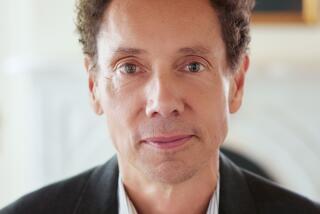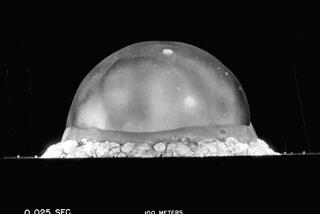Historic turning point or bump in the road?
- Share via
‘ALL CHANGED, CHANGED UTTERLY: A terrible beauty is born.” The poet William Butler Yeats was describing the transformation of Irish politics wrought by the seemingly hopeless Easter Rising of 1916 against British rule. These words resonated again on Sept. 11, 2001, against the backdrop of the shattered World Trade Center.
If the events of that day were terrible, they also seemed to portend a profound change, a turning point not only in the history of the United States but of the world. Most global leaders declared it an attack on both the United States and themselves. NATO invoked its self-defense clause for the first time in its history. There were even pro-U.S. demonstrations in Tehran.
As we all know, opinions were divided on what had happened on 9/11 and in what way the world had consequently changed. To some, it was a day of reckoning for decades of one-sided American foreign policy, rapacious globalization and unilateralism. These people believed that “we” would have to change, to become more in tune with the rage of the dispossessed and marginalized.
Others thought the attacks a punishment for a decade of appeasement of Islamic terrorism and a product of the fundamental lack of freedom of the Arab world. According to that interpretation, “they” would have to change: Dictatorial regimes across the Middle East would have to be removed, starting with the worst of them all, Saddam Hussein’s Iraq. But both sides were in agreement that something profound had happened and that the world, as a result, would be transformed.
But is that really so clear? Many historians have, in fact, resisted the general proposition that history is made up of great turning points and that great events must have great causes. Moreover, there have been plenty of historical turning points that were not “great” at all, but were far from obvious at the time. The French Revolution in 1789, for example, was a seminal event in modern history. But throughout that year and for much of 1790, most European eyes were not on Paris or Versailles but on the Balkans, where the Austro-Russian attempt to partition the Ottoman Empire was threatening to embroil all Europe in war.
More recently, in 1975, “basket three” of the Helsinki accords, which laid down the basic human rights that must be provided by all European countries, including communist dictatorships, was widely and understandably derided as a sham. But it became a thread that helped to unravel the whole Soviet bloc from within. Likewise, the Soviet invasion of Afghanistan in December 1979, which capped a truly dreadful year for the West during which Iran and Nicaragua had been “lost,” actually heralded the terminal overstretch of the Soviet empire. But who would have known it at the time?
It may be a mistake to be preoccupied with big, splashy political events as turning points. The French Annales school of history argued that it is the longue duree of deep-rooted processes, not the short-term drama of events, which really transforms our world. Anybody who has seen Edgar Reitz’s “Heimat” television series on a small west German village in the 20th century will be struck by how the biggest changes are sociocultural: acquiring a motor car, or the advent of prosperity. The major turning points in German history -- the Nazi takeover of power in 1933, for example, or defeat in 1945 -- seem relatively transient.
So, was Sept. 11 a turning point, or did it actually obscure the real shifts of the last five years? Perhaps, as former Chinese Premier Zhou En-lai famously said about the French Revolution, it is too early to tell. One suspects that it is this idea -- that it is “too early to tell” -- that sustains the Bush administration through its trying times in Iraq today. Admittedly, to those who share the vision but lack the absolute faith, their optimism often seems like the triumph of hope over experience.
Politicians, of course, are fond of this argument. Like patriotism, the judgment of history is the last refuge of the scoundrel. All the same, it is a rash historian who will now definitively state which of the many remarkable events of the last five years is a turning point, and in which way.
Was the invasion of Iraq the beginning of Washington contra mundum, or was it the first step in the democratic transformation of the Mideast? If the latter, then the elections of January 2005 in Iraq will take on truly epochal significance; if the former, then that poll will be as irrelevant as the plebiscites with which the old communist bloc sought to legitimize itself.
Will the decisive event in Lebanon be the Cedar Revolution of 2005, which peacefully saw the Syrians off the premises, or Hezbollah’s tenacious defense of the south in 2006? Will the turning point in Iran turn out to be the March 2005 intifada of its Arab population in the oil-rich province of Ahwaz, or some milestone in its history of nuclear development? It really is too early to tell.
In order to establish the significance of an event, we also have to ask what would have happened otherwise, to look at it “counterfactually.” Thus the importance of the Easter Rising in 1916 to the achievement of Irish independence has been disputed. Home rule was already being offered, and even more would probably have been achieved, peacefully, in time. “Was it needless death after all?” Yeats asked. “For England may keep faith/For all that is said and done.”
Without the attacks on the World Trade Center and the Pentagon, we may say with a reasonable degree of confidence that airline travel would have been easier. But beyond that, it becomes difficult to speculate. Some sort of attempt to topple Hussein was brewing in any case. Oil prices would still have risen given the increase in global, particularly Chinese and Indian, demand. The Iranian nuclear issue would be equally acute. And needless to say, the issue of Palestine would still be with us.
None of this, of course, takes account of contingent factors. What if the hijackers were simply lucky? If the 1993 plot against the World Trade Center had succeeded as perfectly as the subsequent one in 2001, one tower would have been brought down on the other, with results far worse than 9/11. Would this have been seen as protest against the incoming Clinton administration, or perhaps against the Oslo peace process? All this, of course, before George W. Bush was even a twinkle in a neoconservative eye.
Here one is reminded of the counterfactual view apocryphally attributed to Mao Tse-tung. It is the ultimate answer to Zhou and all those who seek deeper forces in history. When asked whether he thought that world history would have been very different if Soviet Premier Nikita Khrushchev had been assassinated instead of President Kennedy, Mao replied that he was not sure, but he was quite certain that Aristotle Onassis would not have married Mrs. K.
More to Read
Sign up for Essential California
The most important California stories and recommendations in your inbox every morning.
You may occasionally receive promotional content from the Los Angeles Times.












